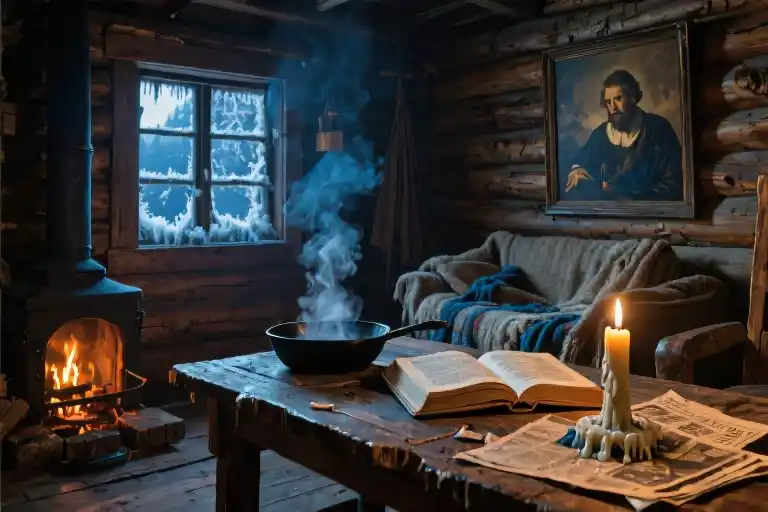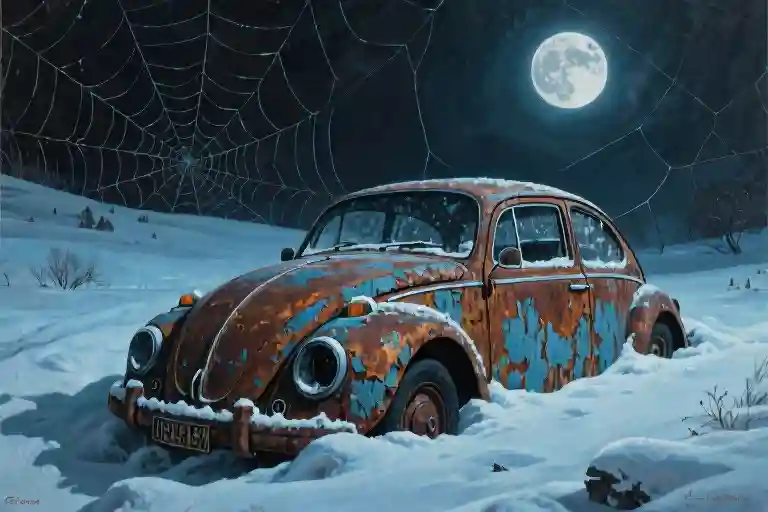The thistle-like wind pierced through the mud-chinked walls of the log cabin, carrying with it the metallic scent of impending snowfall. Under his ragged fur blanket, the boy stirred awake to find the forgotten candle still flickering in its brass holder, its wax pooling like frozen tears on the marked Bible’s leather cover. Downstairs, the predawn symphony of his parents’ morning rituals played in hushed tones – the rhythmic scrape of iron skillet against hearthstone, the brittle rustle of stolen newspaper pages turning.
Bare feet met the unvarnished pine planks of the sleeping loft, each knot and groove imprinted on his soles like a braille map of their isolation. Through the ladder’s horn-shaped rungs, he watched his father’s work-roughened fingers trace the smudged newsprint, the man’s patched overalls a canvas of faded blues and stubborn resilience. Against the far wall, his mother stood sentinel before the fireplace – that cavernous maw of heat and light large enough to swallow a child whole – her spine straight as the chimney iron while bacon fat hissed its morning psalm.
‘Boy, you better cover your tracks. Take my slippers.’ Her voice poured through the chilled air, rich and bitter as the chicory brew steaming in their tin cups. The words held the same practiced cadence as her knife through salt pork, never pausing, never turning. Behind her, frost feathered across the icebox’s metal hinges in crystalline fractals, their delicate beauty at odds with the room’s functional austerity.
Through the single west-facing window, the boy watched the last stars drown in the milky dawn. Somewhere beyond these timbered walls, a world of school bells and census takers stretched its bureaucratic limbs. The newspaper headline caught the candle’s guttering light – ‘Compulsory Education’ in bold black type, the rest obscured beneath his father’s thumbprint. He flexed his own toes against the floorboards, wondering which would leave deeper marks: the government’s paperwork or these handmade nails holding their fragile sovereignty together.
The Frozen Dawn
The boy stirred beneath the heavy furs, his breath forming ghostly shapes in the air. Thistles of wind pried through the mud-chinked logs, carrying with them the scent of pine and something metallic—the promise of another hard winter morning. His bare feet touched the loft’s rough planks before his eyes fully opened, the wood grain imprinting itself on his skin like a frost-etched map.
Below, the cabin hummed with quiet industry. The father’s silhouette bent over a newspaper at the uneven table—his table, crafted from stubborn oak that refused to be tamed into perfect angles. Moonlight through the single window caught the headline’s fragmented words: mandatory…enrollment…penalty. The paper rustled like dried corn husks as he turned a page with hands that knew plowshares better than print.
Across the room, the mother moved between hearth and icebox in a silent ballet. Her back remained turned, but her presence filled the space—the sizzle of fat in the cast iron, the rhythmic scrape of her wooden spoon against the skillet. The fireplace yawned wide enough to swallow a child whole, its glowing belly licking at a blackened coffee pot.
Three details anchored the boy’s awakening:
- The forgotten candle’s wax pooling around the brass holder, its wick still whispering smoke
- His father’s patched overalls—each repair a story in crooked stitches
- The Bible on the nightstand, its marked pages stiff with frozen condensation
The cold climbed his legs as he descended the notched ladder. His toes curled away from the floorboards, seeking warmth that wouldn’t come until the sun crested the ridge. Somewhere beyond these walls, other children slept under electric blankets, their schoolbooks lined up neat as fence posts. Here, knowledge came in stolen newspapers and the spaces between his father’s warnings.
Southern Gothic details bled through every crack:
- The way his mother’s shoulders tensed at the sound of a distant engine
- How his father’s thumb lingered over the newspaper’s date
- The single schoolhouse photograph tucked behind a loose log, its corners nibbled by mice
Winter mornings in the hollow had their own liturgy. The boy learned early that survival was a language spoken in gestures, not words—his father’s knife whittling a new chair leg, his mother’s flour-dusted hands portioning their meager stores. Today’s lesson waited in the trembling pause before his father folded the newspaper, in the extra egg his mother slipped onto his plate.
The table wobbled when he sat down. Neither parent acknowledged it. This too was part of the ritual—the acceptance of imperfections, the silent agreement that some things needn’t be fixed to serve their purpose. Outside, the wind sharpened its teeth against the cabin walls. Inside, three people pretended not to hear the world knocking at their door.
Breakfast and the Ban
The scent of frying bacon curled through the cabin, thick enough to momentarily mask the winter chill seeping through the walls. The son shuffled toward the table, his bare feet recoiling from the plank floor’s bite. His father’s stolen newspaper rustled like dried leaves, the headlines blurred by candlelight and what might have been deliberate smudges of soot.
‘Boy, you better cover your tracks. Take my slippers.’ His mother’s voice emerged without turning, the rich timbre of it pouring through the room like the black coffee steaming near her elbow. Her hands moved between skillet and plates with the efficiency of someone who’d measured every motion against dwindling supplies.
The son watched his father’s thumb pause over a newsprint column. ‘Do I have to go to school?’ The question hung between them, fragile as the ice feathers forming on the window. ‘Why can’t I set traps like you, Pa?’
A log shifted in the fireplace, sending up a shower of sparks that illuminated the father’s face just long enough to catch the tightening around his eyes. ‘It’s the law, son.’ The newspaper crumpled slightly in his grip. ‘You want the sheriff nosing around here? Remember what I said about census men?’ His voice dropped, roughened. ‘First it’s questions, then—’
The sentence died as his mother set a pair of patched slippers between them. The gesture split the tension cleanly—no dramatic confrontation, just wool-stuffed silence and the sound of three people chewing too carefully. The son studied the overlapping repairs on his father’s footwear, each stitch a whispered story of scarcity and stubbornness.
Through the cabin’s single west-facing window, the snow continued its patient work of burying their footprints.
The Unfinished Place Settings
The mother’s hands moved with practiced precision, arranging three chipped plates on the uneven table. The ceramic clinked like wind chimes in the heavy silence. Outside, snow hissed against the cabin walls where mud insulation had cracked like dried riverbeds.
Her son stood motionless by the ladder, his too-large school jacket swallowing his frame. Beneath the stiff new fabric, his toes curled inside his father’s patched slippers – the leather worn thin from years of avoiding government roads. The right sole bore a crescent-shaped repair where a census taker’s dog had snapped at his father’s heel last spring.
‘Your eggs will stiffen,’ the mother said without turning from the hearth. Her voice carried the same quiet command as when she’d taught him to darn socks by firelight. Steam rose from the skillet in ghostly ribbons, blurring the newspaper headline about compulsory education laws that lay abandoned by his father’s empty chair.
A gust rattled the windowpane, extinguishing the forgotten candle with a whispered protest. In the sudden dimness, the son noticed how his mother had positioned his plate exactly between his parents’ settings, forming a fragile bridge across the scarred pine. Her thumbprint smudged the rim where she’d hesitated before placing it down.
Beyond the cabin, a sound like distant thunder pulsed beneath the wind. Not the predictable rhythm of logging trucks on the county road, but something slower, more deliberate. The son’s shoulders tensed – he’d heard that particular growl only once before, when the social worker’s jeep had gotten stuck in their muddy driveway two winters past.
His mother’s spine straightened as she lifted the cast iron. For three heartbeats, the only movement was fat dripping onto coals, each sizzle marking time. Then with deliberate calm, she slid an extra strip of bacon onto his father’s plate, the grease spelling out unspoken warnings like tea leaves at the bottom of a cup.
Somewhere beyond the tree line, a car door slammed. The son’s fingers found the frayed edge of his jacket sleeve where his mother had let out the hem last week, her stitches tiny and perfect as always. He counted them now like rosary beads – twelve stitches for twelve years of being invisible. Outside, booted feet crunched through frozen crusts of snow, coming closer.
The Unfinished Place Settings
The cabin held its breath as the mother arranged three chipped plates on the uneven table. Steam rose from the venison stew in the cast iron pot, drawing ephemeral shapes that dissolved before reaching the rafters. Outside, the wind sharpened its knives against the log walls.
The son stood motionless by the ladder, his government-issued school shirt buttoned to the throat despite the hearth’s warmth. Beneath the stiff new fabric, his toes curled inside his father’s patched slippers – the leather worn thin at the heels from years of evading census takers and truant officers. A splinter of morning light caught the threads where his mother had darned the left sole seven winters running.
‘Your eggs will stiffen,’ the mother said without turning from the fire. Her voice carried the same quiet command as when she’d taught him to snare rabbits or hide their smoke signals from valley patrols. The skillet hissed in agreement.
Across the room, the father’s newspaper lay abandoned beside his carving knife, the headline about compulsory education laws half-buried under bacon grease stains. His work-roughened fingers tapped an uneven rhythm against the table’s warped surface – a morse code of unfinished warnings. That truncated ‘then…’ still hung between them like the ax over the firewood pile.
The son watched his parents take their accustomed seats, the empty space between them yawning wider than the missing chair. His mother’s hands hesitated over the third plate before nudging it precisely two inches toward the center, as though calibrating the exact distance between defiance and surrender.
Through the single west-facing window, snow began erasing the footpaths to the traplines. The forgotten candle by the son’s bed finally succumbed, its last wisp of smoke blending with the scent of wet wool and gun oil. Somewhere beyond the ridge, a sound like a struggling engine blurred into the wind.
In the silence that followed, the son looked down at his incongruous uniform. The starched collar chafed his sunburned neck, while beneath the regulation-length trousers, his father’s slippers left ghostly impressions in the wood ash dusting the floor. The patches on the right toe formed a perfect map of all the places they’d never been visited by school inspectors.
A gust rattled the windowpane, and for a heartbeat, the cabin’s shadows made it seem three figures sat at the table after all.


